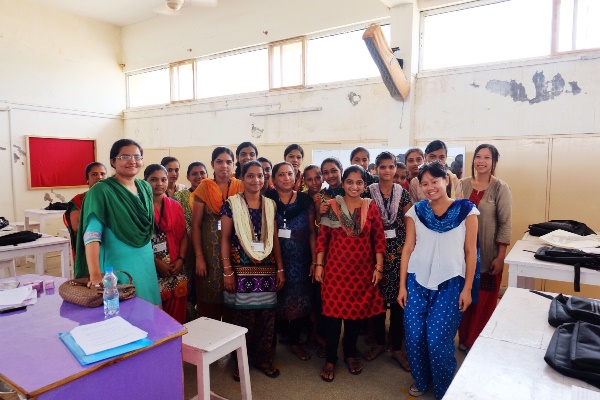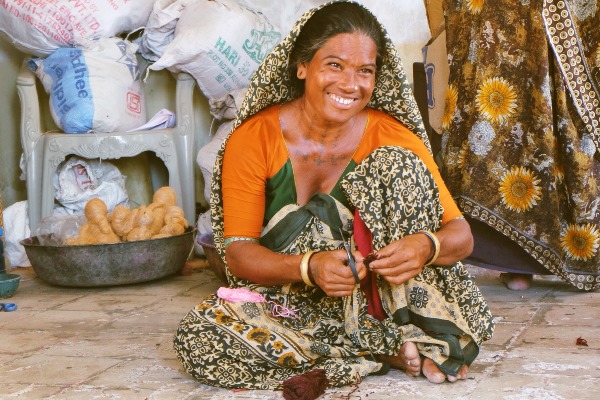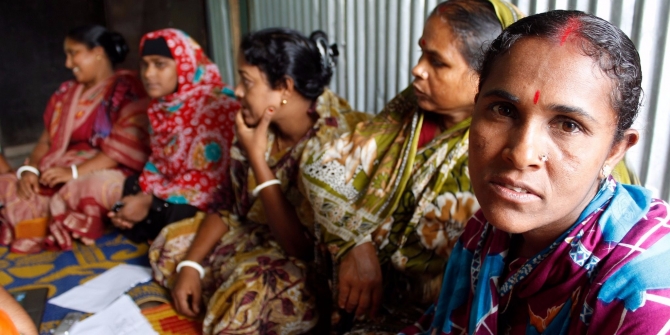 Billie Elmqvist Thurén recently spent two months in Gujarat as part of the Tata Social Intern scheme, an internship programme administered by LSE Careers and the India Observatory. In this article, she discusses her project, which explored the effectiveness of Tata programmes promoting sustainable livelihoods. Focussing specifically on gender issues, she finds that while the intiatives reach out to women and have helped them generate an income of their own, gender norms continue to limit the scope of what they are able to do.
Billie Elmqvist Thurén recently spent two months in Gujarat as part of the Tata Social Intern scheme, an internship programme administered by LSE Careers and the India Observatory. In this article, she discusses her project, which explored the effectiveness of Tata programmes promoting sustainable livelihoods. Focussing specifically on gender issues, she finds that while the intiatives reach out to women and have helped them generate an income of their own, gender norms continue to limit the scope of what they are able to do.
As a Summer Intern on the Tata Social Internship, I spent two months in Okhamandal, Gujarat, conducting a research study for Tata Chemicals Society for Rural Development (TCSRD). I stayed in a town called Mithapur – also known as the “City of Salt” – where Tata Chemicals established its first plant back in the 1930s. Today, the Mithapur plant is one of the largest producers of synthetic soda ash in the world.
My project was titled “Changing livelihood dynamics in local ecosystem: skill-based vocational training vs. agro-based livelihood from a socio-cultural perspective” and it initially took me quite some time to get my head around it. Essentially, in Mithapur and its surrounding villages, TCSRD is involved in the promotion of sustainable livelihoods, both farm- and non-farm based. Non-farm based livelihood initiatives include the promotion of industry-relevant skill development programmes, while farm-based livelihood initiatives include crop breed improvement, water management, and other activities related to the enhancement of agricultural productivity. TCSRD has recognised that there are numerous socio-cultural challenges to the successful facilitation of these initiatives and therefore requested that I document these challenges, by investigating the perceptions of both initiatives from a socio-cultural perspective.
Following some exploratory discussions with TCSRD staff and beneficiaries, I focused on two main socio-cultural indicators – gender and caste. I established a list of key respondents, including self-help group women involved in TCSRD-sponsored handicraft enterprises, students from TCSRD’s tailoring, beautician and hospitality courses, farmers taking part in TCSRD’s agriculture initiatives and village leaders, which in the area are called sarpanches. I then held semi-structured interviews and focus group discussions with my respondents, with questions designed in such a way so that I would be able to extract responses related to gender and caste. Getting answers, however, proved much harder than expected. Firstly, it took me quite some time to fully understand the gender norms and caste relations of the region. Secondly, as gender and caste were sensitive issues in the area, people were initially quite hesitant to answer my questions. Despite these challenges, the study produced some interesting results, particularly in relation to gender issues.

In Okhamandal, resource scarcity and market-related challenges hamper farmer productivity, with many farmers having to resort to non-farm-based livelihoods to sustain themselves and their households. Lack of faith in help schemes, be they government-led or TCSRD-sponsored, further contributes to the perception that other occupations are more profitable. Vocational-based skill training programmes are seen as a potential path towards a non-farm-based source of livelihood for their children, and an increasing number of parents are encouraging their children to embark upon this route. Numerous respondents reported that they wanted their children to leave Okhamandal, confident that more profitable jobs were to be found elsewhere.
However, while boys and men are encouraged to take up technical trainings and migrate to larger cities, girls and women tend to fall by the wayside. In a lot of cases, entrenched gender norms prevent them from finding employment. This is because, for the majority of women in the community, the main priority is to find a husband. Following marriage, women’s roles are restricted to those of caregivers and housewives, and the norm is that they do not leave their homes for work. Though encouraged to undertake TCSRD courses in handicraft work, tailoring and beautician training, women do so because these are skills that they can carry out from their homes. As such, the trainings that TCSRD provides may have a much more limited impact than has been hoped, entrenching gender norms rather than challenging them. Even when women undertake training where future employment will require them to leave their homes, prejudices and threat perceptions obstruct many from doing so. This was clearly observed when I interviewed female students from TCSRD’s hospitality training, who, despite having been offered jobs in larger cities outside of Mithapur, had chosen to stay at home. Several respondents reported that their parents or in-laws did not want them to go and work in hotels outside of Mithapur, as hotels are male-dominated workplaces and therefore unsuitable for women.

Given that gender norms prevent women from finding employment related to skill-based vocational training, working with farm-related activities appears as a more socially acceptable livelihood option, as they can do this close to their homes. However, gender norms limit women’s scope of work within agriculture as well, as they are marginalised in terms of control of land, and thus also participation in support schemes such as training or Farmer Groups. Furthermore, as it is the men who are engaged in the market-related activities of farming, they are also the ones who control the revenue generated from farming. As such, many women are deprived of an independent source of income when working on their husbands’ farms.
The conclusion of my study was that, whichever source of livelihood women in Okhamandal opt for, gender norms limit the scope of what they were able to do. This is the ground reality TCSRD faces when it attempts to promote its sustainable livelihood programmes, and my findings correlate with a lot of the literature on skill development in India. In an examination of the recent surge in vocational skill training programmes in India, Agrawal (2014) found that more than a quarter of the vocationally trained labour force remains unemployed. He shows that the female unemployment rate is much higher than the figure for males – having received vocational training, only 30% of women were employed, which is less than half of the proportion of male counterparts. These figures demonstrate that there is a clear need for gender sensitivity if skill training is to be linked to employment. In a similar study, Comyn (2014) demonstrates that, despite the growing interest in skill development, there remain significant challenges which restrict the skills system in India and weaken its efforts to promote more and better jobs for young people. He attributes this to insufficient structure and resources to link trainings with career and vocational guidance services. These issues also need to be taken seriously if TCSRD’s skill trainings are to be successful. Stronger efforts should be geared at providing career counselling, alumni events, exposure trips and business development, so that girls gain the necessary awareness and confidence to challenge traditional structures.

Notwithstanding these challenges, TCSRD’s livelihood initiatives have been instrumental in challenging many socio-cultural barriers to development and empowerment of individuals in Okhamandal. TCSRD’s skill development initiatives do support numerous girls and women in attaining a better future for themselves and their families, in ways that were previously unimaginable. For instance, TCSRD’s handicraft skill trainings and subsequent formation of clusters have helped 150 women from Scheduled Castes/Tribes and OBC’s become the first in their families to question their traditional roles as housewives and caregivers, step out of the house and generate an income of their own. Furthermore, TCSRD’s skill development centre and outsourced skill trainings have helped many young people develop skills that enhance their employability, helping them find stable sources of income. For instance, despite setbacks, the hospitality training has witnessed many successes, having helped young women obtain qualified jobs in well-reputed hotels. TCSRD’s agro-based livelihood initiatives, in turn, have shifted the traditional farming practices to more productive ones, improving the agricultural productivity of the Okhamandal taluka, allowing farmers to devote more income to the education of their children.
Spending two months with a corporate business as forward-looking and philanthropic as Tata was been an incredible learning experience. I have developed a strong affection for India, and I know that this was just the first of many visits to come.
Cover image: Women working in TCSRD’s coconut fibre handicraft cluster. All images credit:Billie Elmqvist Thurén
Note: This article gives the views of the author, and not the position of the South Asia @ LSE blog, nor of the London School of Economics. Please read our comments policy before posting.
About the Author
 Billie Elmqvist Thurén has a BSc in International Relations from LSE. Her work experience ranges from fundraising for Swedish non-profits such as the Swedish Red Cross to interning at a digital strategy agency that builds social movements. She is currently doing a MSc in Development Management at LSE, hoping that it might someday help her find another job opportunity in India.
Billie Elmqvist Thurén has a BSc in International Relations from LSE. Her work experience ranges from fundraising for Swedish non-profits such as the Swedish Red Cross to interning at a digital strategy agency that builds social movements. She is currently doing a MSc in Development Management at LSE, hoping that it might someday help her find another job opportunity in India.








amazing … I loved all content